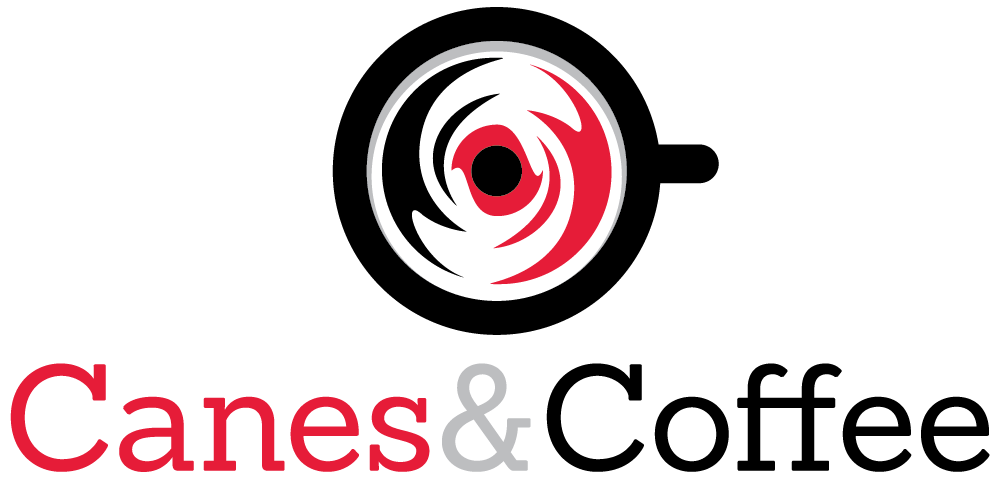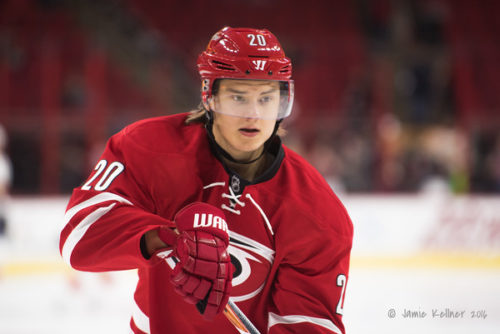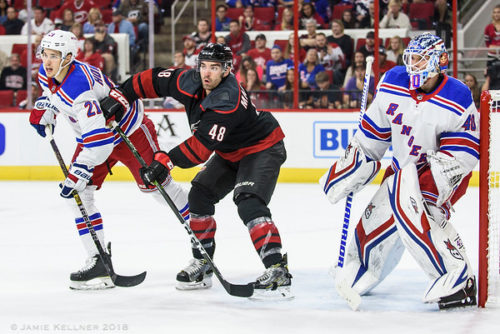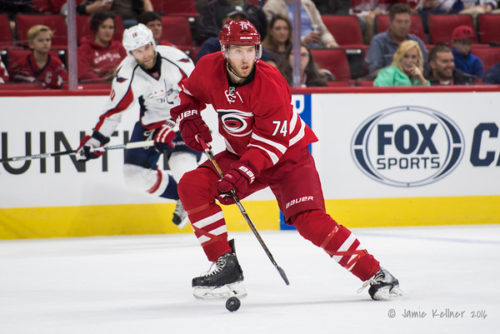Last week, I graded Hurricanes general manager Ron Francis for the 2016-17 season in 2 parts. Part 1 graded Francis on building for the future and building the 2016-17 blue line. Part 2 evaluated Francis work at the forward and goalie positions. He nets about a B or B- if you look only at 2016-17, but his grade rises if you factor in the A that he received for sticking to the plan/building for the future (which is important).
Today’s Daily Cup of Joe does a similar initial evaluation of Coach Bill Peters with a slightly different format.
Bill Peters’ 2016-17 successes
Sticking with it: The team very much could have folded up the tents in mid-March after a tough stretch of unproductive hockey against the NHL’s worst teams in Arizona and Colorado. Instead, the team surged to a 13-game point streak with a 9-0-4 mark and came very close to climbing all the way back into the playoff chase. Peters deserves significant credit for staying heads down and focused on winning and getting his team to do the same.
Getting production from AHL call ups: I thought Peters did an especially good job of putting AHL call ups in roles where they could succeed, showing confidence in them and giving them a chance and netting productive hockey from it all especially at the forward position. In my opinion, the Hurricanes entered the 2016-17 season short in terms of legitimate top 9 forwards, and that was with the optimism that Andrej Nestrasil and Joakim Nordstrom could refind their 2015-16 magic with Jordan Staal. Instead, Peters had to use a variety of AHL call ups to fill top 9 roles. Most notable was Derek Ryan who had 29 points in 67 games for a 42ish-point pace which is pretty solid for an extended run by a player with minimal NHL experience starting the season.
A good season for player development: There were ups and downs, but on the whole I would consider the 2016-17 season a strong 1 for young player development. Jaccob Slavin and Brett Pesce excelled when pressed into a top pairing role. Elias Lindholm found a higher gear just before the midway point in the season and surged through the end. Sebastian Aho built a nice NHL foundation in his rookie season. Had you asked me at the three-quarter mark of the season, I would not have been high on Noah Hanifin’s progress, but once elevated into a top 4 role, he handled the challenge well and played well in the last quarter of the season. Just like with anything, the players deserve individual credit for their success and individual blame for their failures, but I think it is also reasonable to credit Peters for his role in helping players develop.
Match up management down the stretch: Down the stretch at least until the team capitulated, Peters and his staff managed to play match ups and do targeted line juggling to try to coax as much as possible out his lineup. There were times when the logic was not obvious, but the results were there during the 9-0-4 run. Peters deserves credit for pulling levers to get wins.
Bill Peters’ 2016-17 struggles
But to go with the successes, there were also a number of areas where Peters either struggled or at least could have been better.
The start: Peters’ role with Team Canada in the World Cup probably played a role, but for the the third time in 3 years, the Hurricanes did not look ready to start the season. The team exited the 6-game road trip to start the season with a 1-3-2 record. That is on top of a 2-6-0 record start 2015-16 (including 2 home losses before the big road trip) and an abysmal win-less October in 2014-15 with an 0-6-2 record that ended that season before it really even started.
Inability to figure out the blue line until it was too late: Peters started the season with Slavin/Faulk and Hainsey/Pesce but quickly paired Slavin and Pesce to form a top defense pair of sophomore blue liners. The top pair worked, but nothing else really ever did until it was too late. The deficiencies of Hainsey/Faulk were highlighted on the road where the duo was nearly minus 1 goal per game at even strength through late fall and the first part of winter. And except for a short stretch of hockey where Tennyson seemed to help solidify the third pairing, Peters never really did find anything that worked for the third pairing. Hanifin’s best hockey actually came after he escaped it and moved up into Hainsey’s slot in the top 4. If I had to divide up blame, I would pin this more heavily on Francis’ inability to get enough help for Peters, but there is also a responsibility for Peters to make it work reasonably well by some combination of picking match ups, supporting weaker pairings with stronger forward lines or coming up with different combinations.
Overtime woes: I am on record as saying that more than any other part of NHL hockey except possibly special teams, tactics, strategy and execution are more critical in overtime hockey than any other parts of the game. The extra space with only 6 instead of 10 players on the ice completely changes the game by offering more time and space such that extended puck possession is possible. The Hurricanes were 5-9 in overtime and pushed another 9 games to the shootout which was also a bad thing since the team was only 3-6 in the skills competition. The end result was that the Hurricanes left a bunch of points on the table in extra hockey.
Goalie management: Again, distributing credit and blame is murky, but I think Peters has to take his share of the blame for another sub-par season goaltending-wise. He actually had a goalie playing pretty well from the beginning of November into January, but that ended after a run that saw Ward play nearly every game for about a quarter of the season. Second guessing after the fact is easy, but I have to wonder if Ward’s strong play would have extended farther with more rest. Did his downfall come simply from hitting a wall? Could Peters have used Michael Leighton selectively and spelled Ward? Leighton had exactly 1 good start and 1 bad start (a .500 record is not bad for an NHL backup on a middle-ish team) before more or less being shuttered. Peters managed his first short burst of solid starts from Lack finally in March after nearly 2 years of coaching him. I guess we will have more data if Lack departs as I expect this summer, but I cannot help thinking that Peters could have gotten more out of Lack. Regardless, the Hurricanes goaltending was not good enough, and I think it is fair to assign some amount of the blame to Peters.
Inability to scrape out points during tough stretches: There are a couple other options too, but I think one could make a reasonable case that the Hurricanes inability to cut short losing streaks was the deciding factor in the season. After nearly climbing back into the playoff chase, the Hurricanes lost 5 straight in late January without picking up a single point, lost 5 straight again in mid-February (only 1 OTL point), and lost 5 straight (only 1 OTL point) when the season ended in early April. When things went badly, Peters seemed unable to pull levers to grind out a win or a couple points by lineup tinkering, shortening the bench, lighting a fire or whatever else might help. Turn the 5-game losing streaks into 1-2-2 records and the team is in the playoffs right now.
The final grade
When I net it out I give Peters a B. I like him as a coach. I like the general direction of the team right now. And I am optimistic for the 2017-18 season. But at the same time, I think there were coaching-related areas of the 2016-17 season that could have been better, most notably overtime play and inability to cut losing streaks short.
What say you Caniacs?
Did I miss any positives for Bill Peters’ 2016-17 season? How about negatives?
Are there any things that I graded Peters on that you think were very little or not at all within his control?
What grade would you give Peters for the 2016-17 season?
Go Canes!




First, let me say Peters almost blew his biggest decision–putting Bickell in the shootout. Because he didn’t send him out in the last home game, I would have taken a full letter-grade off for the year. But fate provided a second chance, and it created a moment that I think might get pointed to in a few years as having given the organization a special push to become a better team that will be making deep playoff runs.
And you did miss the Bickell angle on the season. If he had been around all 82 games, would Bickell have been more productive than his replacements? And, more importantly, with his winning experience would he have been able to goad the team into a few 1-2-2 instead of 0-5-0 or 0-4-1 stretches? I think Bickell was an acquisition like Stempniak who might have made his line better every night. Peters did a good job with what he had, no argument there just a “what if.”
Your analysis of blue line is spot on. However, when the Canes are hoisting the Cup in a few years, someone may well point out that being sellers in 16-17 was the best thing that could have happened because it gave Hanifin the opportunity to step up.
OT woes. Peters gets a D. I am even tempted to say the Canes should overpay to get Oshie just for shootouts.
2016-17 I am slightly more pleased and would give Peters B+.
Let me start out saying that Bill Peters is the best coach we’ve had in a long time. He started at the bottom and, in tandem with Ron Francis, has this team building toward a consistent winner. He gets a huge amount of credit in my book for sticking with the team’s long-term plan and for building for the future.
The one thing not mentioned, that needs mentioning, is BP’s control and management of his coaching staff.
Many comments (including mine) have been critical of David Marcoux and he has left. Steve Smith has, I think most would agree, has done a great job with a young blue-line and even better on the PK, which has been a huge factor in keeping us competitive. Though there are pockets of sunshine, I’m not sure that we’d all have the same positive things to say about Rod Brind’Amour and the PP, etc. That’s a painful thing to say out loud. He’s a Canes legend and adds a huge amount of leadership, but his role with the team may not be behind the bench next season.
If BP controls his staff, I’m going to include judging him on this aspect of his job, too. Unless he thought stability for a young team was more important, I think he’s been a little hesitant to be assertive in this area of being the Head Coach but that seems to be changing. These are the toughest decisions, and, in my view, like the team in general, he’s growing into this part of his game.
In the post-season press conference, he asserted a goal of being Top 10 in everything. That isn’t just going to happen by accident. It’s going to take coaching, so how he staffs the bench and who he can recruit to help take this exciting and talented young team to the next level next season and beyond will be something to watch in his development.
He’s been on a Pass/Fail system so far – and I give him a Pass – but the letter grades start now.
Oh and one more thing: can we get him to use his Coach’s Challenge a little more judiciously?
Totally agree with the management responsibilities as they relate to putting the right staff in place for success. Changing management personnel is always difficult and painful but moving a folk hero off of the bench ranks up there with one of the truly difficult moves that Peters has to consider. I’m sure Brindamour brings a lot to the table regarding leadership and other intangibles and no doubt there is a role for him in the organization. Too many stats that indicate a steady decline in the success of those he’s responsible for to ignore.
In 1 of the 2 DCoJ articles on the end of season press conference, I talked in some detail about being top 10 in everything or otherwise taking steps to fix/improve it.
I am on record as thinking there is some chance (not a sure thing) that this proves to be a canary in the coal mine in terms of Brind’Amour’s role. The power play has yet to push above #15 in 3 years and was #21 last year under Brind’Amour’s leadership.
The Marcoux thing was a fairly straightforward personnel decision. Because of his rightful standing in the Hurricanes organization, Brind’Amour’s is not. I see 3 options. 1-If Peters/Francis think things are on the right track despite not getting there yet, patience could be in order; 2-There is a chance that more help is employed either in the form of adding a specialist or Peters taking a bigger role; 3-Again, because of Brind’Amour’s earned place in the organization, there is a chance that he changes roles.
If I had to guess I think we get #2, but I do not think #3 is completely out of the question.
Solid B in my book. Seems to be the right coach for a young and relatively inexperienced team where developing team systems, structure and habits is as important as improving the skill levels of the individual players. His teams, at least so far in his tenure, seem to mimic his personality. An even focus, a very businesslike approach with not a lot of extreme highs or lows. Very un-Tortarella like in style. In some ways that is a positive, especially with young players who can be destroyed early in their careers if abused in the name of short term success (see M. Keenan). Interjecting a bit more passion and emotion into the mix would be a good thing in the next step in the progression but it will require some players who can help to get that into the locker room and transfer it to the ice, but the coach can help in that regard as well. That’s why I wasn’t bothered by the Lack comments late in the season. Show some emotion and put it on the players. They need to be challenged and my hope is we see a passionate team right out of the gate in the Fall and set the tone for the season. That is Peter’s next challenge but a failure to change and spend another season with the meh factor, will mean a step backward no matter how many high profile teenagers are in the pipeline.
Everything dmilleravid said. Right down to the judicious use of coaches challenges. Seriously BP, did you win a single one this year?
I don’t think you can fault Peters as much for our lack of OT prowess, but I don’t know how much time they spent practicing overtime situations either. Great player development, great manipulation of the lines. Interesting tactics. I hope he’s a playoff coach as much as a building coach, because he deserves to be, but we will see next season. As everyone has said, next year the gloves come off. Game on.
I love our coach! does more with less than any coach in the league. Now its time for Ronnie to find him the players he needs. Rebuild is over so lets go.
I’ve no big problem with the evaluation of Peters, as most of your analysis is extremely accurate! My minor challenges are overtime losses… (Peters should have done MUCH BETTER), and on the plus side (you really gave Ronnie an undeserved pass…should have been
an incomplete, at best, and D or F…considering the pieces he forced Peters to work with!!! That made Bill having to put too
many square pegs into round holes! My analogy (maybe better) is RF gave Bill a revolver…BUT only half-loaded! Pull trigger…and…
SURPRISE…nothing happens…?? Peters alluded to THAT in the media presser, when he said the NEEDS HAD TO BE FILLED WITH non-ahl
PERFORMERS (or words to that affect)! I’d say that was a pretty clear complaint about the level of candidates available to use on
his ROSTER!!
Pertinent to this discussion, Jamie Kellner has fascinating piece at CanesCountry about Justin Faulk’s season. What floored me is how poor Ron Hainsey played. I know Matt pointed this out several times, but I didn’t think he was quite so negative on so many metrics I haven’t found a current WAR for hockey, but it seems possible that the main reason the Canes missed the palyoffs was Hainsey. For instance, if Hainsey was -2 WAR, suddenly the Canes are in the playoff hunt until the last 2 games. Maybe Peters doesn’t so much need “non-AHL” performers as veterans who don’t make the other 4 players on the ice less effective 21 minutes every game. It seems the biggest move to improve for 2017-18 has already occurred. I really don’t like saying this as I like Hainsey.